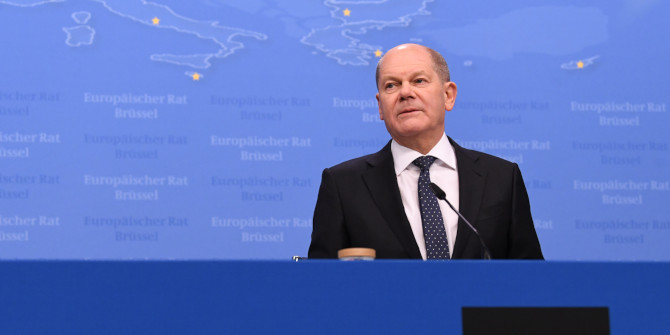 If Britain chose to leave the European Union, it would not only have an effect inside the UK, but also on the rest of Europe. Iulian Fruntașu, the Moldovan Ambassador to the UK, presents his view on the referendum. He argues that the UK’s interests will continue to be affected by globalisation regardless of whether the country chooses to leave the EU on 23 June.
If Britain chose to leave the European Union, it would not only have an effect inside the UK, but also on the rest of Europe. Iulian Fruntașu, the Moldovan Ambassador to the UK, presents his view on the referendum. He argues that the UK’s interests will continue to be affected by globalisation regardless of whether the country chooses to leave the EU on 23 June.
As the truism goes, it is the sovereign right of the British people to decide whether to stay in or leave the European Union in the upcoming referendum on 23 June. Yet, it is difficult to escape the feeling that something surreal is hanging over this question, like the notorious Great Smog which hung over London in 1952. Indeed, in many ways the public’s perception of the referendum is as toxic as that experience must have been for the Londoners of the 1950s.
It is often assumed that referendums are designed to promote accountability and strengthen democracy. Yet, it is highly debatable whether these benefits are present when the public are asked to adjudicate over more complex issues like the pros and cons of EU membership or how the EU should improve its functioning. In one of my previous jobs, as Director of European Initiatives Programme at the Soros Foundation, I dealt with EU related issues, and after 4 years in that position I knew there was still so much more to learn.
Therefore, despite public information campaigns, I believe that the largest majority of voters will express an opinion based on the way the issue is presented in the media or in accordance with personal anxieties. As a matter of fact, this is one of the reasons why we elect officials – to delegate the responsibility to professional bureaucracies to take decisions on our behalf.
The challenge to democracy is how to represent essentially unrepresentable swings in the public mood, amplified by the media and social networks that favour immediacy at the expense of critical thinking. This smoke screen might never turn into a toxic smog, yet it diverts our attention away from real problems.
Leaving to one side whether the UK will leave the EU, what is strange is that so many people seem to cherish what is defunct – the nation-state. This happens now at times when non-state actors like large multinational corporations are more powerful than many states and when there are challenges like international terrorism, climate change, global pandemics and cross-border crime.
So does it matter whether the UK will stay in the EU or not? In the wider perspective, the answer is no. While it is fashionable to be angry these days, it is less fashionable to be level-headed. Common global challenges will force people to practice more critical thinking than is currently promoted by the media. We are lazy because we can afford to be. This cannot last.
There is a temptation to compare the popular anger toward elites that is now present on both sides of the Atlantic. And while there is certain hypocrisy in the US and UK in using immigration and the EU as scapegoats, I don’t believe this is a fully rationalised and internalised policy. Yet, it is no coincidence that in times of crisis, or rather imagined crisis, primordial instincts take over and societies’ angst pushes countries into isolationism.
The key question is whether this isolationism will work. There are reasons to think that it won’t. Therefore, regardless of the rise of illiberal movements on the extreme right and left in Europe and the US, it is difficult to imagine the rise of large-scale movements, like Nazism or Stalinism, could occur again. Globalisation is unstoppable, immigration is unstoppable, and technology is unstoppable. These will trump everything and everybody, including Trump-like politicians in Europe.

The United Kingdom can, of course, leave the EU if it decides to. It will look more like leaving the bridge of a ship, where the main decisions are made, for an inside cabin somewhere on a lower deck, closer to the engines, while being on the same vessel. It might be that illusions of sovereignty are important to the British public, but as with any illusion there will be a time for waking up to the realities of the new world and its different ideals and requirements.
To be clear, the EU has many shortcomings and both member states and aspiring ones, like the Republic of Moldova, are very much aware of these. Yet, the EU is what the member states allow it to be, and there are many states, in particular in Eastern and Central Europe, that share the same British drive for more efficiency, accountability, and free markets.
Anything that goes against these ideals, including anti-immigration instincts and policies, is very much both anti-European and anti-British. Therefore, the liberal principles governing the free movement of goods, services and people within the EU are of paramount importance to the very existence not just of the European Union, but to stability and security in Europe.
It is obviously not the Union we want. The European aspiration is determined by the will to be part of a club that exercises a modernising effect over the associate and candidate countries. With diminished clout, an inward-looking EU would not be able to export stability to its borders and help the reformist forces in respective countries.
However, from a wider historical perspective, the referendum on 23 June is largely irrelevant. More powerful global forces are at play and if we can only imagine the world in 100 years, future generations will smile at the passions displayed during this particular debate.
Please read our comments policy before commenting.
Note: This article gives the views of the author, and not the position of EUROPP – European Politics and Policy, nor of the London School of Economics.
Shortened URL for this post: http://bit.ly/25bwrMF
_________________________________
About the author
 Iulian Fruntaşu
Iulian Fruntaşu
Iulian Fruntaşu has been the Moldovan Ambassador to the United Kingdom since 2011. He has previously worked for the Moldovan Government as Foreign Policy Adviser and has been a Lecturer in Political Sciences and International Relations at the Institute of Political Studies and International Relations in Moldova.






“so many people seem to cherish what is defunct – the nation-state.”
Such a sweeping statement suggests wishful thinking (perhaps anti-nationalism) by the author rather than the reality.
Is it not curious that the United Nations recognises more independent countries than ever before?
Is this not a recognition that people want to be governed by representatives of their owne community with a shared experience and vakues – and not by foreigners?
Such passive “nationalism” is not to be feared as might Imperial expansionism – but to be ce.lebrated as an improvement in democracy and empowerment of people.
“The key question is whether this isolationism will work.”
In the context of the UK’s EU Referendum, “isolationism” speaks to the Author’s acceptance of Remain’s characterisation of Leave.
All serious Leave campaigners are looking to re-enage more with the World, to get away from the “fortress Europe” mentality of the EU.
“It will look more like leaving the bridge of a ship, where the main decisions are made, for an inside cabin somewhere on a lower deck, closer to the engines, while being on the same vessel.”
Remain’s notion of “influence” seems based on “cocktail-party politics” rather than the ability to take independent action.
Being outvoted at least 55 times (as has the UK) is clearly less influential than retaining the ability to “go it alone” on something and see whether a different policy is effective.
“main decisions are made” is a grevious misunderstanding of how Rules are made in the EU – and the World.
i) EU laws are proposed by EU Officials and agreed by foreign politicians. The “foreign” bit doesn’t matter if they happen to agree with you – but if not, they cannot be voted out by your electorate.
ii) Many EU laws originate in World Trade Bodies (many based in Geneva) – which pass them to regional and national bodies to implement.
Presumably Moldova has a seat on many such bodies, so can ensure that it’s voice is heard.
By contrast, the UK’s voices is diluted, having to hope that the EU’s nice chap from (say) Slovakia remembers the UK’s issues.
“the liberal principles governing the free movement of goods, services and people within the EU are of paramount importance to the very existence not just of the European Union, but to stability and security in Europe.”
The EU’s “Single Market” requires more than “free movement”. It requires free “settlement” too.
The population of Moldova is less than 4 million – in an area about the size of Wales – or the Southern Counties from Cornwall to Kent.
The UK has received around 5 million net migrants – most (but not all) coming to the congested London and South East.
Could Moldova build enough houses, classrooms, hospitals and transportation to accommodate (say) 350,000 new people?
And what if the “net” figure was half the “gross” figure?
How well would Moldova assimilate (say) 600,000 people, most speaking a different langauge and many bringing different values?
Historically the UK has done well at integrating migrants – but in much smaller numbers.
Let’s get real !
“It will look more like leaving the bridge of a ship, where the main decisions are made, for an inside cabin somewhere on a lower deck, closer to the engines, while being on the same vessel.”
A better ship analogy:
The EU is the Titanic.
The EU Commission is the Captain.
National (elected) Governments are Officers on the Bridge – arguing over the ship’s course, perhaps blind to the iceberg, too big and clumsy to steer a safer course.
The UK is a smaller, but still significant ocean-going ship – with it’s own Captain and Officers sharing a common purpose – able to steer it’s own course – and more manouverable if faced with an iceberg.
There are some very good points here. How am I qualified to make such an important decision. My mind changes each week as I educate myself more on the pros and cons of being in the EU, but I am sure that there are many people in the UK that have not and may be voting based on the “propaganda” that they are being fed with daily by both sides. Democracy is not perfect and never will be.
There are some good parallels between Moldova and the UK. Both countries are deciding on which course as far as the EU is concerned and the electorate is split. Maybe that is where the parallels finish because when it comes to your comments about “we elect officials to delegate the responsibility to professional bureaucracies to take decisions on our behalf” then those officials need to be elected fairly and transparently without corruption to represent the people. In the UK I can converse with my elected representative in parliament quite freely. Actually my MP and myself in the UK have regular conversations and when I vote for my Conservative MP he generally stays a Conservative MP and doesn’t change sides on the whim of some over-controlling Oligarch or alternatively a pawn of Moscow as is currently the case in Moldova. The difference here is that Moldovans have little concept of real democracy, while the British have hundreds of years experience and wish to retain their democracy that they feel is being stolen from them by unelected bureaucrats in Brussels. However much I love Moldova (I live there part of the year and my wife is from Molodova) it is irrelevant in terms of world trade and Britain is the 5th Biggest economy in the world.